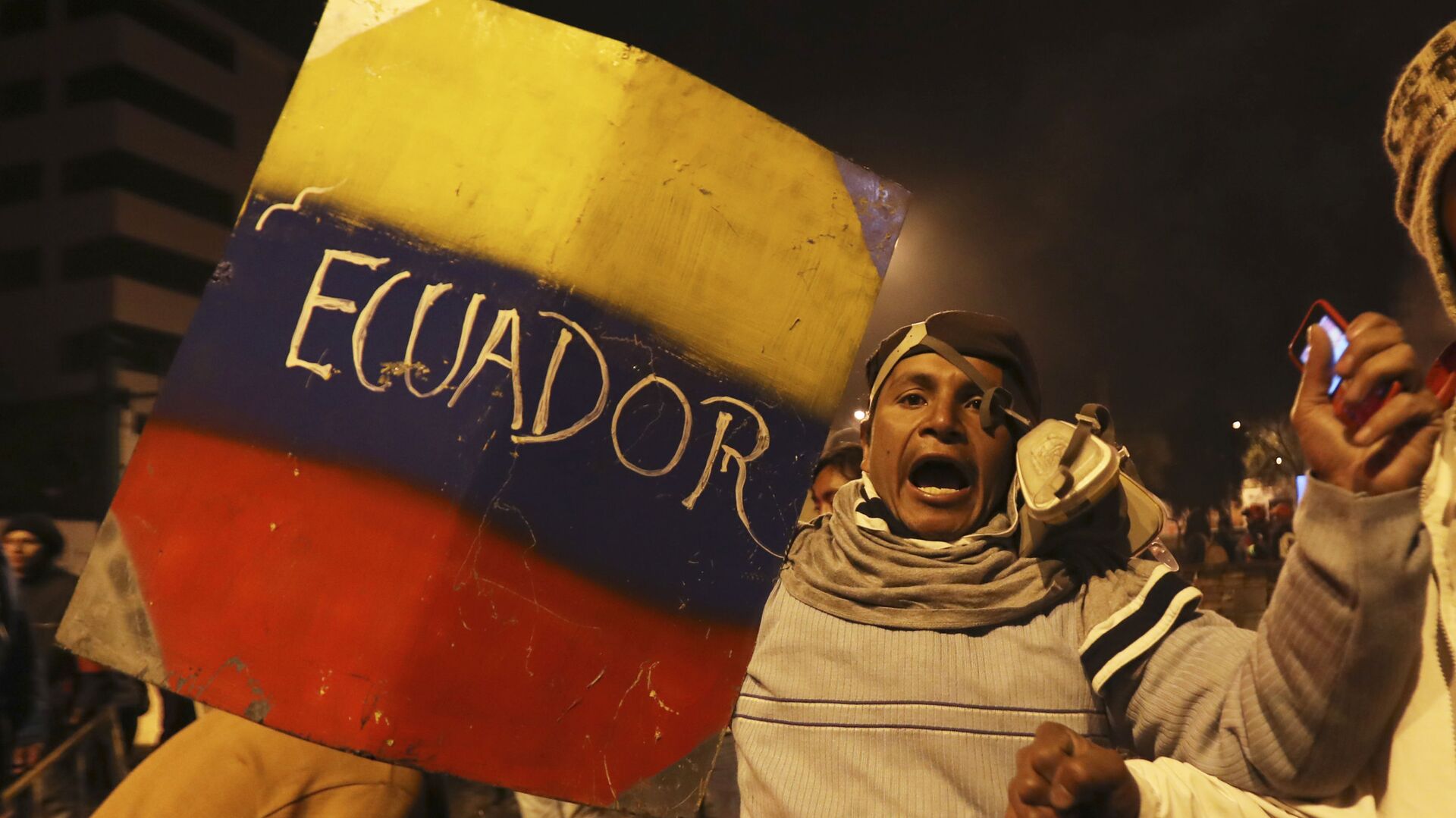https://sputnikglobe.com/20220621/ecuador-expands-state-of-emergency-to-three-more-provinces-amid-indigenous-protests-1096517977.html
Ecuador Expands State of Emergency to Three More Provinces Amid Indigenous Protests
Ecuador Expands State of Emergency to Three More Provinces Amid Indigenous Protests
Sputnik International
MEXICO CITY (Sputnik) - Ecuadorian President Guillermo Lasso on Tuesday declared a state of emergency in three more provinces, bringing the total to six, in an... 21.06.2022, Sputnik International
2022-06-21T09:26+0000
2022-06-21T09:26+0000
2022-06-21T09:26+0000
ecuador
state of emergency
https://cdn1.img.sputnikglobe.com/img/107704/84/1077048440_0:140:3147:1910_1920x0_80_0_0_e03896b01027ec3948f7c4a465150f19.jpg
"To declare emergency in the provinces of Chimborazo, Tungurahua, Cotopaxi, Pichincha, Pastaza and Imbabura due to serious unrest," a decree published on the government's website read.According to Lasso, the protests are directed against democracy and seek to overthrow the government.On June 13, the Confederation of Indigenous Nationalities of Ecuador, CONAIE, launched small protests against social and economic policies of the country's leadership in 11 regions. The unrest gained momentum the next day, when the police detained CONAIE's leader, Leonidas Iza, for 24 hours on charges of interfering with the work of public services.On June 18, Lasso declared a state of emergency in a number of regions, including the capital city of Quito. The president also approved urgent measures to support Ecuadorian families amid economic hardships. Those included freezing fuel prices, canceling privatization in utilities, increasing benefits, subsidies and soft loans to agricultural producers and writing off $3,000 worth of debt to the state-run public bank BanEcuador.Iza, who is now facing criminal prosecution, has called the measures insufficient and urged citizens to continue protests indefinitely despite the state of emergency and curfew.The tactics of the indigenous people, who are blocking roads and hindering oil production as part of their protests, have faced criticism from the Ecuadorian society, in particular, entrepreneurs, oil workers and members of the largest trade union of transport workers. Ecuador's state oil company, Petroecuador, suspended operations on Monday over a "force majeure."To date, the Ecuadorian police have detained 86 people during the demonstrations. In addition, 61 were injured in attacks by protesters and one person died as a result of a fall from height. Representatives of the indigenous population captured 14 police officers.
Sputnik International
feedback@sputniknews.com
+74956456601
MIA „Rossiya Segodnya“
2022
Sputnik International
feedback@sputniknews.com
+74956456601
MIA „Rossiya Segodnya“
News
en_EN
Sputnik International
feedback@sputniknews.com
+74956456601
MIA „Rossiya Segodnya“
Sputnik International
feedback@sputniknews.com
+74956456601
MIA „Rossiya Segodnya“
ecuador, state of emergency
ecuador, state of emergency
Ecuador Expands State of Emergency to Three More Provinces Amid Indigenous Protests
MEXICO CITY (Sputnik) - Ecuadorian President Guillermo Lasso on Tuesday declared a state of emergency in three more provinces, bringing the total to six, in an attempt to stop the ongoing protests of the indigenous population against economic and social policies of the country's leadership and prevent further casualties.
"To declare emergency in the provinces of Chimborazo, Tungurahua, Cotopaxi, Pichincha, Pastaza and Imbabura due to serious unrest," a decree published on the government's website read.
According to Lasso, the protests are directed against democracy and seek to overthrow the government.
"We have extended a hand, called for dialogue, but they don't want peace, they want chaos. They want to overthrow the president. I'm here, I'm not going to hide, but I'm here to protect all your families, especially the poorest. Democracy vs chaos — it is a big battle, a battle for democracy," Lasso said in an address to citizens.
On June 13, the Confederation of Indigenous Nationalities of Ecuador, CONAIE, launched small protests against social and economic policies of the country's leadership in 11 regions. The unrest gained momentum the next day, when the police detained CONAIE's leader, Leonidas Iza, for 24 hours on charges of interfering with the work of public services.
On June 18, Lasso declared a state of emergency in a number of regions, including the capital city of Quito. The president also approved urgent measures to support Ecuadorian families amid economic hardships. Those included freezing fuel prices, canceling privatization in utilities, increasing benefits, subsidies and soft loans to agricultural producers and writing off $3,000 worth of debt to the state-run public bank BanEcuador.
Iza, who is now facing criminal prosecution, has called the measures insufficient and urged citizens to continue protests indefinitely despite the state of emergency and curfew.
The tactics of the indigenous people, who are blocking roads and hindering oil production as part of their protests, have faced criticism from the Ecuadorian society, in particular, entrepreneurs, oil workers and members of the largest trade union of transport workers. Ecuador's state oil company, Petroecuador, suspended operations on Monday over a "force majeure."
To date, the
Ecuadorian police have detained 86 people during the demonstrations. In addition, 61 were injured in attacks by protesters and one person died as a result of a fall from height. Representatives of the indigenous population captured 14 police officers.

